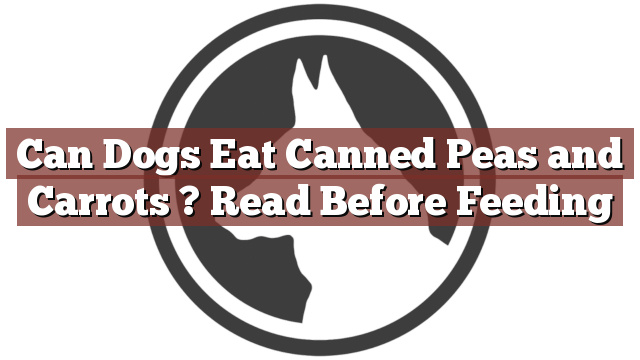Understanding Your Dog’s Dietary Needs
Understanding your dog’s dietary needs is essential for their overall health and well-being. Dogs are omnivores, which means they can consume both meat and plant-based foods. However, their nutritional requirements differ from humans. A balanced diet for dogs usually consists of high-quality protein, essential fats, carbohydrates, vitamins, and minerals. It is important to note that not all human foods are safe for dogs to consume. Some foods can be toxic and cause digestive issues or other health problems. Therefore, it is crucial to research and ensure that the food you offer your furry friend is safe and beneficial for them.
Can Dogs Eat Canned Peas and Carrots? Read Before Feeding
Can dogs eat canned peas and carrots? This is a common question among dog owners who are looking to offer their pets a variety of vegetables. The answer is yes, dogs can eat canned peas and carrots in moderation. These vegetables can provide some health benefits to your furry friend. Peas contain essential nutrients such as vitamin A, vitamin C, and dietary fiber. Carrots, on the other hand, are rich in beta-carotene, vitamin K, and potassium. These nutrients can support your dog’s immune system, promote healthy digestion, and contribute to their overall well-being. However, it is important to note that while canned peas and carrots are generally safe for dogs, they should not be the main component of their diet.
Pros and Cons of Feeding Canned Peas and Carrots to Dogs
Feeding canned peas and carrots to your dog has its pros and cons. One advantage is that these vegetables can add variety to your dog’s diet and provide them with essential nutrients. Additionally, peas and carrots can be a healthy option for overweight dogs, as they are low in calories and high in fiber. However, it is important to consider some precautions. Canned vegetables often contain added sodium, which can be harmful to dogs, especially those with heart or kidney problems. Therefore, it is advisable to choose low-sodium canned vegetables or opt for fresh or frozen peas and carrots. Moreover, always consult your veterinarian before introducing any new food to your dog’s diet to ensure it aligns with their specific dietary needs and health conditions.
Conclusion: Considering the Guidelines for Feeding Canned Peas and Carrots to Dogs
In conclusion, dogs can eat canned peas and carrots, but it should be done in moderation and following certain guidelines. These vegetables can provide some health benefits to your furry friend, but they should not replace a balanced diet that includes high-quality protein and other essential nutrients. When feeding canned peas and carrots, choose low-sodium options or consider fresh or frozen alternatives. As always, consult your veterinarian before introducing any new food to your dog’s diet to ensure it is safe and suitable for their individual needs. By understanding your dog’s dietary needs and making informed choices, you can ensure their overall health and well-being.
Thank you for taking the time to read through our exploration of [page_title]. As every dog lover knows, our furry friends have unique dietary needs and responses, often varying from one canine to another. This is why it's paramount to approach any changes in their diet with caution and knowledge.
Before introducing any new treats or making alterations to your dog's diet based on our insights, it's crucial to consult with a veterinarian about [page_title]. Their expertise ensures that the choices you make are well-suited to your particular pet's health and well-being.
Even seemingly harmless foods can sometimes lead to allergic reactions or digestive issues, which is why monitoring your dog after introducing any new food item is essential.
The content provided here on [page_title] is crafted with care, thorough research, and a genuine love for dogs. Nevertheless, it serves as a general guideline and should not be considered a substitute for professional veterinary advice.
Always prioritize the expert insights of your veterinarian, and remember that the health and happiness of your furry companion come first.
May your journey with your pet continue to be filled with joy, love, and safe culinary adventures. Happy reading, and even happier snacking for your canine friend!

